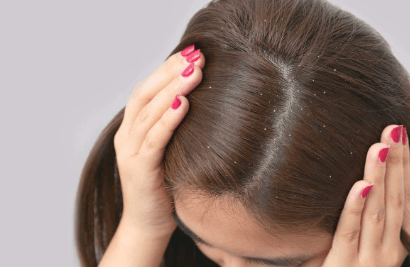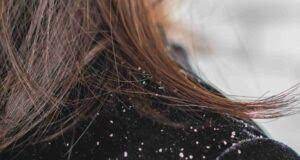Dandruff is a common condition that causes the skin on the scalp to flake. It isn’t contagious or serious. But it can be embarrassing and difficult to treat. Dandruff – those dry, white flakes of skin you brush off your collar or shoulders is harmless. But it can be embarrassing and itchy. Dandruff really isn’t about your hair, or how often you wash it. Instead, it’s about the skin on your scalp.
Skin cells that grow and die off too fast are the problem. Exactly why that happens isn’t clear. A very common fungus called malassezia may contribute to dandruff. This fungus lives on the scalp of most healthy adults without causing any problems. One theory is that the immune system of someone with dandruff may overreact to that fungus.
Dandruff may get worse when you’re stressed or sick. Cold, dry winters can trigger dandruff or make it worse, too.
Symptoms
Dandruff signs and symptoms may include:
- Skin flakes on your scalp, hair, eyebrows, beard or mustache, and shoulders
- Itchy scalp
- Scaly, crusty scalp in infants with cradle cap
The signs and symptoms may be more severe if you’re stressed, and they tend to flare in cold, dry seasons.
Causes
Dandruff may have several causes, including:
- Irritated, oily skin
- Dry skin
- A yeastlike fungus (malassezia) that feeds on oils on the scalps of most adults
- Sensitivity to hair care products (contact dermatitis)
- Other skin conditions, such as psoriasis and eczema

When to see a Doctor
Most people with dandruff don’t require a doctor’s care. See your primary care doctor or a doctor who specializes in skin conditions (dermatologist) if your condition doesn’t improve with regular use of dandruff shampoo.
Risk Factor
Almost anyone can have dandruff, but certain factors can make you more susceptible:
- Age: Dandruff usually begins in young adulthood and continues through middle age. That doesn’t mean older adults don’t get dandruff. For some people, the problem can be lifelong.
- Being male: Dandruff is more prevalent in males than in females.
- Certain illnesses: Parkinson’s disease and other diseases that affect the nervous system also seem to increase risk of dandruff. So does having HIV or a weakened immune system.
Treatment
The itching and flaking of dandruff can almost always be controlled. For mild dandruff, first try regular cleansing with a gentle shampoo to reduce oil and skin cell buildup. If that doesn’t help, try a medicated dandruff shampoo. Some people can tolerate using a medicated shampoo two to three times a week, with regular shampooing on other days if needed. People with drier hair would benefit from less frequent shampooing and a moisturizing conditioner for the hair or scalp.
- Pyrithione zinc shampoos (DermaZinc, Head & Shoulders, others): These contain the antibacterial and antifungal agent zinc pyrithione.
- Tar-based shampoos (Neutrogena T/Gel, Scalp 18 Coal Tar Shampoo, others): Coal tar slows how quickly skin cells on your scalp die and flake off. If you have light-colored hair, this type of shampoo may cause discoloration. It can also make the scalp more sensitive to sunlight.
- Shampoos containing salicylic acid (Jason Dandruff Relief Treatment Shampoo, Baker P&S, others): These products help eliminate scaling.
- Selenium sulfide shampoos (Head & Shoulders Intensive, Selsun Blue, others): These contain an antifungal agent. Use these products as directed and rinse well after shampooing, as they can discolor the hair and scalp.
- Ketoconazole shampoos (Nizoral Anti-Dandruff):This shampoo is intended to kill dandruff-causing fungi that live on your scalp.
- Fluocinolone shampoos (Capex, Derma-Smoothe/FS, others): These products contain a corticosteroid to help control itching, flaking and irritation.
Remedies
You can take steps to reduce your risk of developing dandruff or to control it:
- Learn to manage stress: Stress affects your overall health, making you susceptible to a number of conditions and diseases. It can even help trigger dandruff or worsen existing symptoms.
- Eat a healthy diet: A diet that provides enough zinc, B vitamins and certain types of fats may help prevent dandruff.
- Develop a hair and scalp care routine that suits you: If you tend to have an oily scalp, daily shampooing may help prevent dandruff. Gently massage your scalp to loosen flakes. Rinse thoroughly. If your hair tends to be dry and your scalp is sensitive, shampoo less frequently and condition your scalp between washings (Design Essentials, Melanin Haircare, ScalpBliss).
- Get a little sun: Sunlight may be good for controlling dandruff. But because exposure to ultraviolet light damages your skin and increases your risk of skin cancer, don’t sunbathe. Instead, just spend a little time outdoors. And be sure to wear sunscreen on your face and body.
- Limit hair-styling products: Hair-styling products can build up on your hair and scalp, making them oilier.

